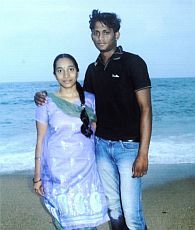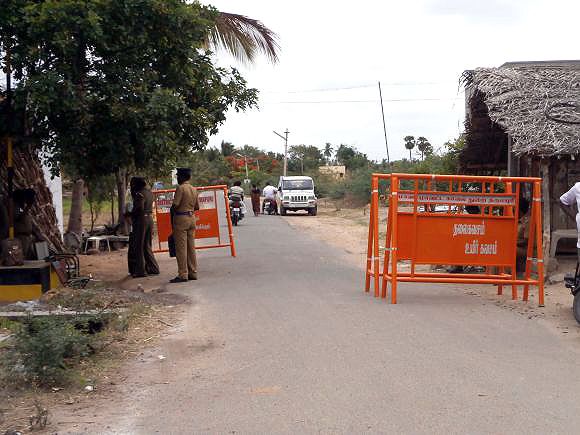 On July 4, 2013, the body of a young Dalit boy, Ilavarasan, was found on a culvert adjoining the railway track in Dharmapuri, northern Tamil Nadu. Initially thought of as a suicide, his family suspected foul play by upper caste groups.
On July 4, 2013, the body of a young Dalit boy, Ilavarasan, was found on a culvert adjoining the railway track in Dharmapuri, northern Tamil Nadu. Initially thought of as a suicide, his family suspected foul play by upper caste groups.
Ilavarasan’s mistake was falling in love, and eloping and marrying Divya, who belonged to the higher, Vanniyar caste. Two
Weeks after they were married, the Vanniyars had a meeting in Divya’s natal village of Sellankottai, constituted a kangaroo court, and ordered Divya to come home. Divya refused. Her father Nagarajan committed suicide on the same evening, which led to riots resulting in burning down of scores of Dalit houses.
Nobody seems to be clear on what really happened. The local policemen say the case was being investigated by the state Crime Branch-Criminal Investigation Department and plead ignorance. The Dalits in Natham Colony, to which Ilavarasan belongs, say that nothing will happen, as the higher caste (the Vanniyars) were rich and politically powerful.
One year later, Rediff.com’s A Ganesh Nadar travels to Ilavarasan’s village, and finds out that caste culture still prevails at its worst in Tamil Nadu
On the June 28 this year, cops came to Natham Colony, to which Ilavarasan belonged, and arrested three men. They were told that if the leaders from their village came and cleared some doubts they would be released. Three more men went to speak to the police. They too were arrested. Later, the police arrested another man.
The jailed men are S Shakti, 35, M Durai,46, C Santosh,22, S Adhiyaman, 23, G Ashok, 28, G Shankar, 35 and K Thirupathi, 22. Thirupathi is a second-year student at a polytechnic college. The police claim that they found Naxal pamphlets in his house.
Locals allege that the police made these men dig near a spot where Ilavarasan is buried. “Two country-made guns and explosives were found exactly where the police told them to dig,” says a villager.
As we turn from the main road to Natham Colony, police barricades greet us. A group of policemen rush towards our car. One writes down the number of the vehicle, while another checks my press card, takes my visiting card and notes it down in a log book that is lying open on a table near the barricade.
“Will you leave the village today?” the inspector asks me. I assure him that I would leave before sunset. Only then were we allowed to proceed.
Ilavarasan’s parents are not at home -- his mother had gone to visit his grave and Elangovan, his father, is at work. I manage to get Elangovan on the phone.
“Why have you come to meet me? You want me to get arrested too? I remember you from last year. I don’t want you to come to my workplace. You wait there if you want. I will come at 7 pm,” he tells me.
“I lost my son. All I wanted to do is observe his death anniversary. I wanted everyone to remember him. I had invited family, friends and also political leaders to come and honour our son. I also asked the police for permission but they refused,” he says.
“The police refused permission for the anniversary event. I got permission from the high court with conditions. The event will happen between 2 and 4 pm. Only 100 people are allowed, villagers, family and friends and no politicians, says Rajnikanth, Elangovan’s lawyer.
“No one knows what is happening with the arson case, but the government gave compensation of RS 7.35 crore, which was used to re-build their homes. I will make sure that case is taken to its logical end,” he informs.
"In Ilavarasan’s case, the police said it was suicide and that he was hit by a train. The railways have declared that there was no accident involving any of their trains passing through Dharmapuri on July 4, 2013. I have moved a petition in the high court, asking for an inquiry which doesn’t involve the local or state police,” he says.
“I have moved a bail application for all the arrested youth in the lower court. I have also asked for anticipatory bail for 20 others, who the police allege are involved in the same case. I have asked the court for medical treatment for the six accused who have been beaten up very badly,” he says.
Fear hangs over Natham. A group of young men sitting outside a temple are clearly hostile and unhappy with our presence. Reluctantly, a young man leads us to one of the arrested men’s house.
Kalpana is G Shankar’s wife. “My husband is a science graduate. He works with the local milk co-operative society. We have three children. You think a father of three children would go around throwing bombs or shooting people?” she asks incredulously.
“My husband has never been arrested before. He has no criminal record. I sent his younger brother Ashok to find out what happened and they arrested him too,” she rues.
“Ashok has a masters in arts and also holds a BEd degree. He works as a medical representative. This is his wife and this is their son,” she points to a thin woman who looks devastated and dazed. Her young son, who is barely one-year-old, is sitting at her feet.
Suddenly, an old woman who turns out to be a neighbour, started yelling at me.
 “Do you know this is Ilavarasan’s village? Do you know this colony, along with two other colonies were burnt to the ground? Do you know that we fled for our lives? Do you know that we live in fear? Do you know that not a single person has been punished for that arson?” she says.
“Do you know this is Ilavarasan’s village? Do you know this colony, along with two other colonies were burnt to the ground? Do you know that we fled for our lives? Do you know that we live in fear? Do you know that not a single person has been punished for that arson?” she says.
Shankar and Ashok’s mother who are sitting by my side start crying. “My youngest child was only two when my husband died. You don’t know the difficulties I faced in bringing up my kids and educating them. Now they are being beaten up by policemen for no reason. Our only fault is that we are Dalits and we belong to Ilavarasan’s village,” she wails.
When we are back on the road, a sub-inspector wants a lift. “Could you take me to the next village? It is only a kilometer away. I am on duty at Sellankottai village (The village that Divya belongs to). There are 500 policemen posted there for Ilavarasan’s death anniversary,” he informs me.
We pass Divya’s house. I would have liked to meet her, but decide that discretion is the better part of valor and keep going.
Where the village ends and the fields start, there is a single house surrounded by vegetation. Even from a distance you can see that every single empty space on the walls has the ‘two leaves’ (Symbol of the All India Anna Dravida Munetra Kazhagam) painted on it. This is the home of an Amma (Tamil Nadu Chief Minister J Jayalalithaa) devotee and the panchayat president of Marwadi village under which Sellankottai.
President Malliga Krishnan is a woman. As is the norm all over Tamil Nadu, even if she is the most respected person in the village, it is the husband who will do the talking.
Krishnan is an amiable man in his 60s. He is sitting on a wood and string bed on his verandah. He is a typical village ‘zamindar’ (landlord) and full of hospitality. He tells us to sit, calls out for water and then settles down to speak to us.
“Divya belongs to my village; Ilavarsan belonged to the next village. After they eloped and got married, we had many meeting between the two communities, but Ilavarsan did not listen to us, he preferred the legal route,” he says.
“The lower castes are now well-educated and they are better off financially, which is a good thing. Love happens at a certain age. This one became tragic because of outside interference,” he says.
“Nagarajan’s (Divya's father) funeral had 500 to 600 outsiders, who were not our family or our friends. But they belonged to our caste. They descended on the Dalit colonies and burnt them down. No one was injured because no one was there,” he informs.
Next day people from my village were arrested but they were let out when they explained that they were simply standing on the road for the funeral. I was called by the state CB-CID to Salem. I went with other village elders,” he says.
“I told them exactly what I am telling you now. We didn’t know who they were. We didn’t know what happened to that case. Tomorrow is Ilavarsan’s death anniversary. I am not expecting any Dalit men to attack me. I have no idea what the police are doing or why they are arresting them. You ask them that,” he claims.
Dharmapuri district Superintendant of Police Asra Garg is an efficient officer who is trusted by the public. When we visit him, he seems tired, but welcomes us with a wide smile. “I agree that the arrested men have families, but you don’t know what happens to normal people when the caste issue raises its ugly head,” he says.
“The Ilavarsan case is closed. I can show you all the affidavits and the procedures. There is no doubt that he committed suicide. The state CB-CID is dealing with the arson case, and they will do what is necessary.
We will make sure that nothing goes wrong. Any political leader who tries to come here will be arrested on the district border. They are allowed to come to the burial site in the afternoon. About a 100 of them will come in a single file to pay homage. We will make sure that they come in a single file,” he says.
“We will make sure peace is maintained. There is nothing to worry,” he assures.
On July 4, the villagers did line up to pay homage to Ilavarsan at the court-designated hour. In a single file.
What will happen to the men in jail? Will the arsonists ever be punished? Divya has not found peace. Sitting in her home surrounded by 20 cops, is she grieving for her husband or for her father?
We will never know.







